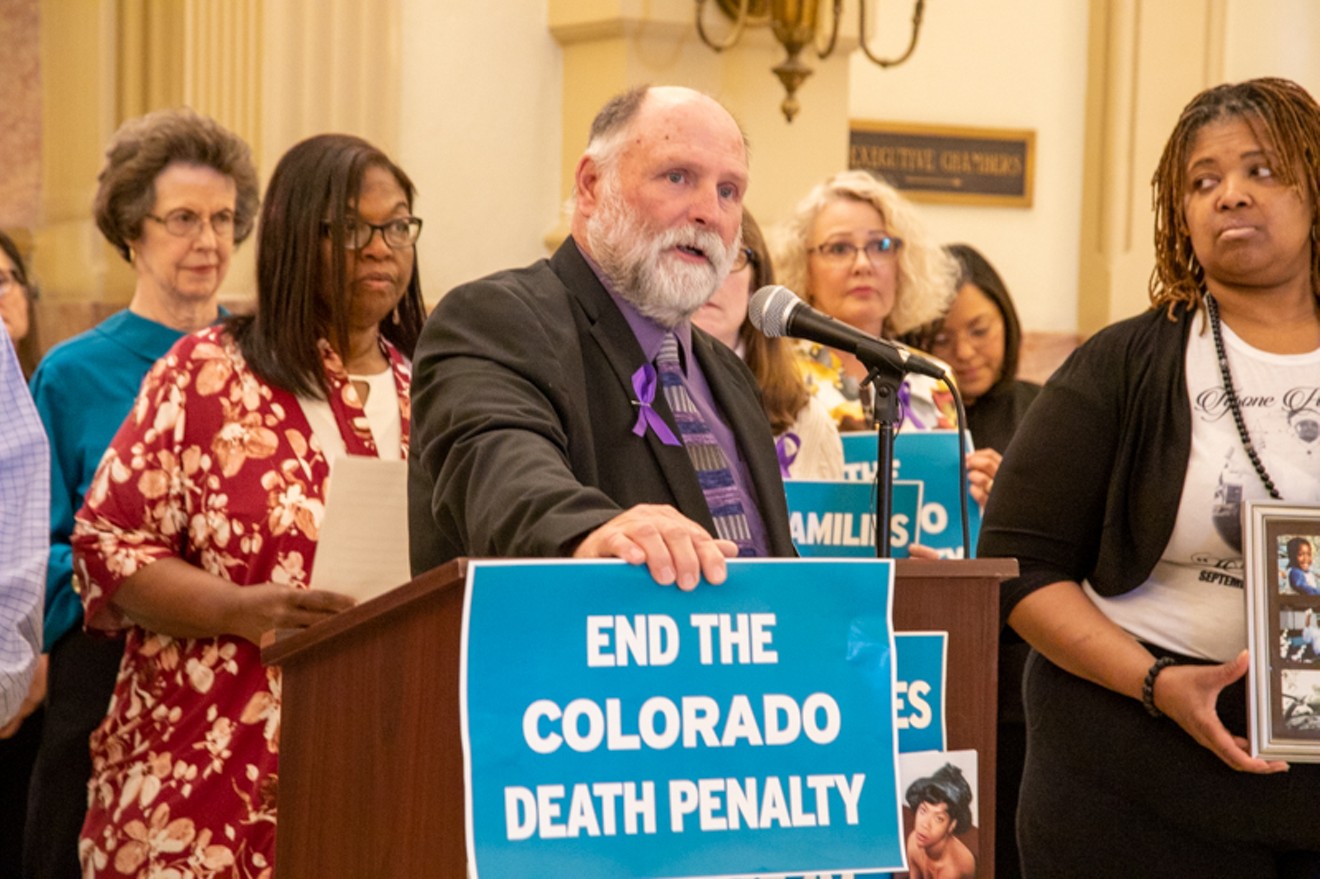Following about six hours of emotional testimony from family members of murder victims, attorneys and religious leaders, a death penalty repeal bill passed its first legislative hurdle at the State Capitol on Monday, January 27.
"I am convinced that it is constitutionally infirm, that it violates the Eighth Amendment’s prohibition on cruel and unusual punishment. It is certainly cruel. What could be more cruel?," said Senator Pete Lee, a Democrat from El Paso County, just before a majority of Colorado's Senate Judiciary Committee approved the bill along party lines. Democrat senators Julie Gonzales, Robert Rodriguez and Lee voted in favor of the bill, while Republican senators Bob Gardner and John Cooke voted against it.
Advocates of repeal say the bill has enough support in both the House and Senate to pass. It even has significant bipartisan support, as Jack Tate, a Republican senator from Centennial, is one of the main sponsors of the bill, and co-sponsors include Republican senators Kevin Priola and Owen Hill.
A death penalty repeal bill has failed five times since 2007. Last year, a repeal bill failed after Senator Rhonda Fields, a Democrat from Aurora, chastised fellow lawmakers for rolling out the bill too quickly. Fields lost her son, Javad Marshall Fields, when he and his fiancée, Vivian Wolfe, were killed in 2005 by two of the three individuals who are currently on death row in Colorado. Another well-known Democrat, Representative Tom Sullivan of Aurora, also spoke in a committee hearing last year in favor of keeping the death penalty. Sullivan's son, Alex, was killed in the 2012 Aurora theater shooting. The two lawmakers still both oppose repeal.
Recognizing the criticism, proponents tabled the bill, saying they'd be back in 2020.
Although Fields didn't testify during yesterday's hearing, her daughter, Maisha Fields, delivered about twenty minutes of testimony in opposition to the bill. "This death penalty bill puts victims against victims. It puts people who are suffering day to day against one another," Maisha Fields said.
Multiple prosecutors also spoke in favor of keeping the death penalty and urged lawmakers to let the issue be solved by voters. "This is a decision that the people should make. The people can petition to abolish the death penalty if they choose to do so," said Dave Young, district attorney for the 17th Judicial District, which includes Adams and Broomfield counties.
Denver District Attorney Beth McCann disagreed with Young.
"We have seen these really significant, important issues get lost in the political advertising, in the amount of money that is spent. And depending on who has the resources, that side gets so much more attention. I think this particular decision is so critically important that subjecting it to that political process would not be appropriate," said McCann, who favors repeal.
While Fields and Young were part of a group of seven who testified against repealing the death penalty, McCann and over forty others spoke in favor of repeal.
"My spirit tells me to tell you that we’re all being damaged in our spirits by having the death penalty," Tim Ricard, the husband of Mary Ricard, a Colorado corrections officer killed by an inmate in 2012, testified at the hearing.
Ricard told lawmakers that he and his family kept telling prosecutors that they didn't want Miguel Alonso Contreras-Perez, the inmate who killed Mary, to be sentenced to death. But their pleas were ignored.
"Every time we went to a court hearing or met with them, we were re-victimized and frustrated because they weren’t listening to us, obviously," Ricard said. Contreras-Perez and prosecutors in Crowley County eventually came to a plea agreement that keeps him in prison for life without the possibility of parole.
The religious argument against the death penalty was also frequently cited by those who testified.
"If I view murderers as no longer being fit to live, setting aside their humanity, I am no longer abiding by one of the core beliefs of my Christian faith," said Gail Rice, whose brother, Denver police officer Bruce Vanderjagt, was murdered in 1997.
Advocates of death penalty abolition also spoke about the disproportionate representation of people of color on death row in Colorado, since all three of them are black, and the excessive cost of litigating death penalty cases.
If the bill is successful, Colorado, which hasn't executed someone since 1997, would become the 22nd state to repeal the death penalty.
[
{
"name": "Air - MediumRectangle - Inline Content - Mobile Display Size",
"component": "12017618",
"insertPoint": "2",
"requiredCountToDisplay": "2"
},{
"name": "Editor Picks",
"component": "17242653",
"insertPoint": "4",
"requiredCountToDisplay": "1"
},{
"name": "Inline Links",
"component": "18838239",
"insertPoint": "8th",
"startingPoint": 8,
"requiredCountToDisplay": "7",
"maxInsertions": 25
},{
"name": "Air - MediumRectangle - Combo - Inline Content",
"component": "17261320",
"insertPoint": "8th",
"startingPoint": 8,
"requiredCountToDisplay": "7",
"maxInsertions": 25
},{
"name": "Inline Links",
"component": "18838239",
"insertPoint": "8th",
"startingPoint": 12,
"requiredCountToDisplay": "11",
"maxInsertions": 25
},{
"name": "Air - Leaderboard Tower - Combo - Inline Content",
"component": "17261321",
"insertPoint": "8th",
"startingPoint": 12,
"requiredCountToDisplay": "11",
"maxInsertions": 25
}
]












